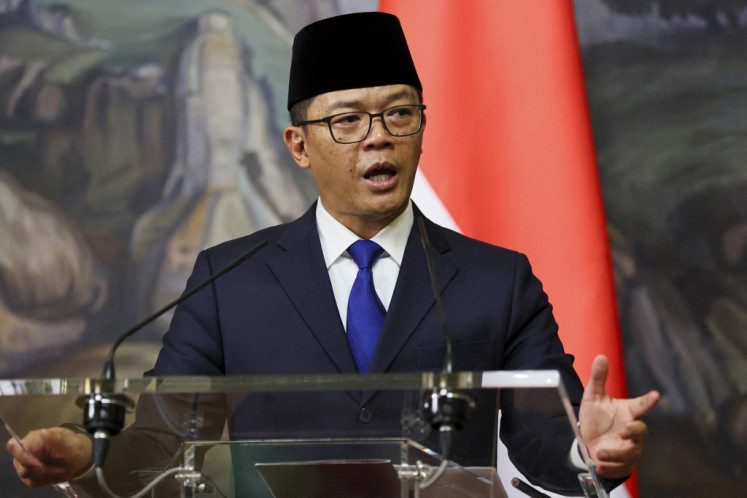Popular Reads
Top Results
Can't find what you're looking for?
View all search resultsPopular Reads
Top Results
Can't find what you're looking for?
View all search resultsLand clearing ignites inevitable conflict
When negotiations over land acquisition for public infrastructure turns ugly, the use of threats as a regular last resort is inevitable
Change text size
Gift Premium Articles
to Anyone

W
hen negotiations over land acquisition for public infrastructure turns ugly, the use of threats as a regular last resort is inevitable.
Mass organizations known to run racketeering and underground debt collecting businesses are hired to do the job.
“We are usually hired to help secure land or guard disputed territory so it wouldn’t be forcefully overtaken by its previous owner,” said Roni, a low-ranking member of the South Jakarta chapter of the Betawi Brotherhood Forum (FBR).
The father of one recently said that his organization had often received orders from either local administration or investors to help them “secure” land in areas where toll road construction would take place.
According to Roni, for a single job the FBR is able to deploy up to 200 members, depending on the risk level of the job.
“We usually deploy more than 100 members on the first day of a ‘land occupation’ process. We need at least 10 people to guard the land for the ensuing days,” said Roni, who last year joined an FBR team to “protect” a plot of land in South Petukangan subdistrict in South Jakarta.
The land had been acquired for the construction of toll road passage linking Ulujami in South Jakarta and Kebon Jeruk in West Jakarta. The road is part of the Jakarta Outer Ring Road West-2 (JORR W2) project. The JORR project has been left uncompleted for more than a decade.
Although the FBR and several other Betawi-ethnic organizations have regularly dominated the land security business in the city, Roni claimed his organization preferred to use persuasive approaches to convince local residents over matters regarding the sale of their land.
Any physical confrontations, however, usually only occurred when the organization was provoked by another ethnic-based group hired by land owners.
“The FBR will only support the party which has the stronger legal position in a land ownership dispute. That’s why we have been quite successful in this business,” said Roni, adding that an FBR member could earn around Rp 100,000 (US$11.5) per day for settling a disputed land claim.
According to the Agrarian Reform Consortium (KPA), 106 major land disputes took place across the country in 2010, in which 41 are related to public infrastructure — and with toll roads in particular.
“Instead of intensifying persuasive approaches and two-way dialogue with local residents, the government always argues that the use of excessive force is sometimes necessary for the greater good,” said KPA chairman Usep Setiawan.
Usep suspected the involvement of land mafia in many land clearing projects, as indicated by a massive land purchase by certain parties other than the government or investors in areas where toll road construction would take place.
According to Usep, such practices had occurred even before the project contract had been signed.
“These mafias have relied on information from insiders in either government institutions or toll road developers. However, it’s very hard for us to prove it,” he said.
According to the Public Works Ministry, there are currently 24 toll projects that have gone idle due to problems associated with land rights, and as a result the costs for clearing these particular areas of land has suddenly soared.
The central goverment and local administration have a set of regulations that prohibit land aimed for public infrastructure to change hands to other parties unrelated with the projects. The land price is also pegged at a certain price to prevent any speculation.
In reality, however, the regulations lack enforcement.
The Jakarta administration has had more than one bad experience in such cases.
For example, by exploring a legalistic approach to settling a dispute between investors and land owners, last year Governor Fauzi Bowo issued a gubernatorial decree capping the price of land to within a construction price range suitable for the JORR W2 project.
Under the regulation, residents whose land would be impacted by a project, such as those living in South and North Petukangan subdistricts in South Jakarta, are only allowed to sell their land for between Rp 920,000 and Rp 3.9 million per square meter.
The decree has triggered an uproar, with hundreds of impacted residents represented by the Jakarta Legal Aid Agency (LBH) filing lawsuits last month with the Jakarta Administrative Court.
The residents requested the court amend the decree, which they considered unfair.
“The local residents have never refused the construction of the toll road, but they feel disappointed with the local administration, which has never involved them in a discussion for land valuation,” LBH Jakarta public lawyer Kiagus Ahmad said.
While the legal process is conspicuously lengthy and tiring, the residents are undeterred by the various pressures they received, pushing them to sell their property.
Tatang, a senior resident who has been living in South Petukangan since 1970s, said his reluctance to sell his house, located on a 200-square-meter plot of land, was triggered more by the emotional bond between himself and his house, and not money.
“Even thugs and police have tried to force me to sell my house. But I’ve never given up,” he said.









